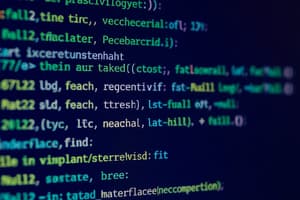Podcast
Questions and Answers
What character is used to terminate strings in C?
What character is used to terminate strings in C?
- \0 (correct)
- <EOF>
- #
- ' ' (space)
What does the function strcat() do in C programming?
What does the function strcat() do in C programming?
- Calculates the length of a string
- Compares two strings for equality
- Initializes a string with a specific value
- Appends one string to another (correct)
What is the primary purpose of the null character in C strings?
What is the primary purpose of the null character in C strings?
- To mark the beginning of the string
- To replace spaces in a string
- To initialize strings automatically
- To indicate the end of a string (correct)
How does the strlen() function differ from the sizeof() operator when used with strings?
How does the strlen() function differ from the sizeof() operator when used with strings?
What will the strcmp() function return if two strings are identical?
What will the strcmp() function return if two strings are identical?
What is the main difference between strncmp and strcmp functions?
What is the main difference between strncmp and strcmp functions?
What happens if the destination buffer is not large enough when using strncpy?
What happens if the destination buffer is not large enough when using strncpy?
When using strncat, what responsibility does the caller have regarding the destination string?
When using strncat, what responsibility does the caller have regarding the destination string?
What is a crucial aspect of the strncat function?
What is a crucial aspect of the strncat function?
What is the behavior of strcpy when copying a string?
What is the behavior of strcpy when copying a string?
Flashcards
String in C
String in C
A sequence of characters terminated by a null character ('\0').
strcat()
strcat()
A function that appends one string to another.
strcmp()
strcmp()
A function that compares two strings, returning 0 if they are identical.
Null Terminator
Null Terminator
Signup and view all the flashcards
strlen()
strlen()
Signup and view all the flashcards
What is a string in C?
What is a string in C?
Signup and view all the flashcards
What is the null terminator?
What is the null terminator?
Signup and view all the flashcards
How to declare a string variable in C?
How to declare a string variable in C?
Signup and view all the flashcards
How to access and modify characters in a C string?
How to access and modify characters in a C string?
Signup and view all the flashcards
What is a string literal?
What is a string literal?
Signup and view all the flashcards
What does strncmp(str1, str2, n) do?
What does strncmp(str1, str2, n) do?
Signup and view all the flashcards
What does strncat(dest, src, n) do?
What does strncat(dest, src, n) do?
Signup and view all the flashcards
What does strncpy(dest, src, n) do?
What does strncpy(dest, src, n) do?
Signup and view all the flashcards
What does strcmp(str1, str2) do?
What does strcmp(str1, str2) do?
Signup and view all the flashcards
What does strcat(dest, src) do?
What does strcat(dest, src) do?
Signup and view all the flashcards
Study Notes
Strings in C
- Strings in C are sequences of characters, represented as arrays of characters.
- A crucial difference between a string and a character array is that a string has a null character ('\0') at the end. This signals the end of the string to the C compiler.
- Strings in C are typically declared using double quotes (e.g., "Hello"). Character arrays do not automatically append the null terminator. When the compiler creates a character array and initializes it with a string literal like "Hello", it automatically appends the null terminator '\0' to the end of the string.
- Strings can be initialized in various ways:
- As an array of characters with a fixed size.
- Directly initialized using a string literal which includes the null terminator.
- By manually assigning each character to the array, explicitly defining the array size.
- Automatically setting the array size based on the characters assigned when initializing.
- Accessing characters in a string is like accessing array elements; the index starts at 0. The
%cformat specifier is used to print a single character from a string. - To modify a character in a string, access it using its index, just like modifying an element of any array.
String Functions in C
- Using C string functions requires including the
<string.h>header file. - Common string functions include:
strcat(): Concatenates (joins) one string to another.strcmp(): Compares two strings. Returns 0 if they are equal; a value less than 0 if the first string is lexicographically less than the second; a value greater than 0 if the first string is lexicographically greater than the second.strlen(): Calculates the length of a string (excluding the null terminator).strncmp(): Compares the first n characters of two strings. Returns 0 if equal, less than 0 if string1 is less than string2, greater than 0 if string1 is greater than string2.strncat(): Appends at most n characters from source to destination. Does not automatically append the null terminator.strncat(char *dest, const char *src, size_t n): Appends at most n characters fromsrcto the end ofdest.destmust have enough allocated space, and the null terminator fromsrcis included in the count n.strcat(char *dest, const char *src): Appends the entire stringsrcto the end ofdest.destmust have enough space for the result.strncpy(): Copies at most n characters from source to destination. The destination string is always null-terminated.strncpy(char *dest, const char *src, size_t n): Copies up to n characters fromsrctodest.destmust be large enough to hold the n characters plus the null terminator, otherwise, undefined behavior may result.strcpy(): Copies the entire string from source to destination.strcpy(char *dest, const char *src): Copies the entire stringsrctodest.destneeds enough allocated space for the entire contents ofsrcand the null terminator, otherwise, undefined behavior may result.
- These functions are crucial for string manipulation, but improper use of them can lead to buffer overflows.
String vs. Character Arrays
- The key difference between strings and character arrays is the null terminator ('\0').
- A string is a specific type of character array; a character array might not include a null terminator.
String Initialization
- Initialization assigns a value to a variable when it's declared. This ensures the variable starts with a known value.
- When you initialize a string with a literal, the C compiler automatically determines the correct size of the array, including the null character ('\0').
- If the literal is shorter than the declared array size, the remaining positions are filled with '\0'.
Using strlen() and sizeof()
strlen()calculates the number of characters in a string up to, but not including, the null terminator, returning an integer.sizeof()returns the total size of the string in memory, including the null terminator.- Avoid using
strcpyand always usestrncpywith appropriate size checks to protect against buffer overflow vulnerabilities.
Studying That Suits You
Use AI to generate personalized quizzes and flashcards to suit your learning preferences.




